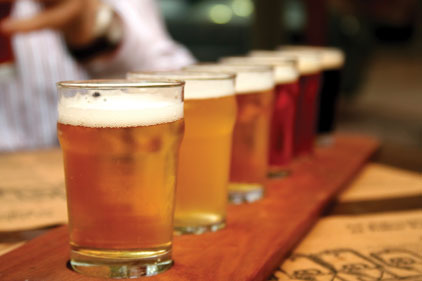Moreover, the trend toward craft beer options is set to enjoy robust growth through 2017, with Mintel forecasting the segment to grow to $18 billion by 2017 -- a result that will see the segment tripling in the decade between 2007 and 2017.
Jennifer Zegler, beverage analyst at Mintel, says, “The growth rates seen by craft beer are impressive, especially during a period when domestic and imported beers have shown a flat to declining performance. Unlike its domestic and imported beer counterparts, craft beer has been able to defy overall beer market trends and continue expansion during the economic downturn and subsequent slow recovery. While the craft and craft-style beer category remains a small segment of the $78 billion U.S. beer industry, the category has been able to stabilize the overall beer industry, which has experienced volume declines in the domestic and imported beer categories since 2008.”
The rise of craft beer in the U.S. has been supported by increasing consumer demand. Nearly a quarter (24%) of consumers who drink beer indicate that in 2012 they drank more craft beer sold at stores compared to 2011. Meanwhile, more than one in five (22%) report consuming more craft beer in bars or restaurants.
When looking at age, Mintel research shows that craft beer’s sweet spot is with 25-34 year old consumers. While overall, some 36% of U.S. consumers drink craft beer, half (50%) of older Millennials (25-34 year olds) do so. Craft beer also wins on taste. Some 43% of both Millennials and Generation X say that craft beer tastes better than domestic beer, compared to 32% of Baby Boomers.
Although successful, craft beer is not free from challenges. Only 17% of Millennials and 18% of Generation X say that craft beer is a better value. Instead, a majority (56%) of consumers of all ages feel that domestic beer is better value compared to craft beer. Furthermore, Mintel research found that nearly half (45%) of consumers would try more craft beers if they knew more about them.
“Despite the variety of beer releases created by craft breweries, craft beers are not yet everyday beer choices for most drinkers due to a lack of understanding about their taste profiles. To continue growing, craft beer must be its own best advocate and expand appeal beyond Millennials who are most likely to consume craft beer. An additional barrier is lack of knowledge. Craft brewers need to focus on education through tastings and classes that inform consumers about the differentiation in flavor between craft beer and other alcoholic drinks,” Zegler explains.
In addition, Mintel research found that 50% of overall craft beer drinkers express interest in locally made beer, and 25% are interested in purchasing craft beer where it was brewed. Another 39% say that they are influenced to purchase a craft beer if it has a personality to which they can relate.
“Buying local is not limited to supporting one’s homebase; it also provides consumers with the ability to support towns that they do not currently call home. To bring that local feel to consumers regardless of location, craft breweries should consider partnering to create multibrewery variety packs that would offer consumers a taste of one city, state, or region. These taste-of-an-area packages would allow consumers to experience smaller breweries from their own or other geographies,” Zegler concludes.
